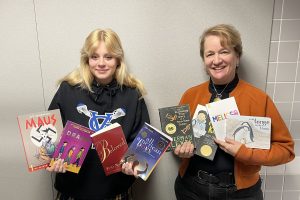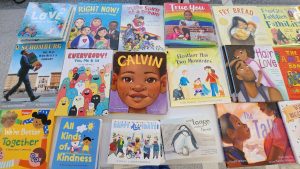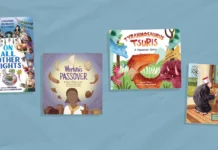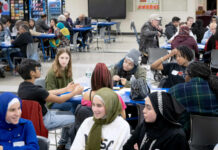
A 2022 Pen America study found more than 2,500 instances of school districts around the country taking books out of their libraries and curriculums during the 2021-’22 year. More than 40% of the 1,648 titles impacted contained LGBTQ+ themes and/or characters, while 40% included Black or brown characters. Many of the 1,648 books were about sex (22%), race and racism (21%) and rights and activism (10%).
To combat efforts to ban such titles, Beth Chaim Reform Congregation in Malvern is dedicating the fifth night of Chanukah to giving some of them out as gifts.
Beth Chaim’s social justice committee put together a list of 75 books to order from Children’s Book World in Haverford. Members of the committee are also going around to the synagogue’s religious school sessions and other activities to see if congregants want to place orders.
People outside of the temple are welcome to buy books as well and can do so by emailing [email protected]. All buyers can pick up their orders at the synagogue at any point during Chanukah, which begins on Dec. 18. The social justice committee is recommending that people who buy books give them to family members and friends as gifts on the fifth night of Chanukah to start a new tradition.
The goal, according to social justice committee member Lois Lamond, is to “make our community aware of what is happening in terms of book banning and what they can do.” That includes contacting school board members, attending school board meetings and saying “we want our children to have these materials,” Lamond said. The committee is selling “Heather Has Two Mommies” by Leslea Newman and “Hair Love” by Matthew A. Cherry, a story about a Black girl growing to love her hair, among others.
“For a child who’s never had an experience with someone who’s different from them, a book would be an opportunity,” Lamond said.
The idea for the banned book sale came up a month ago during a meeting of the social justice committee. Later, Rabbi Michelle Pearlman told the committee about a Yom Kippur sermon given earlier this year by Rabbi Sharon Brous in Los Angeles. Brous recommended that people buy the banned books they were concerned about losing.
Beth Chaim members saw it as a Jewish issue, too. A small percentage of the books taken out of schools, like “The Diary of Anne Frank” and “Maus” by Art Spiegelman, were about Jews. Plus, as Pearlman explained, “We’re lifting up the fact that historically banning books is dangerous.” Pearlman mentioned that the Nazis started burning books in 1933, years before they began putting Jews in concentration camps.
Removing a book from a school library is, of course, not the same as burning it. Districts and parents always need to make decisions about which books are best-suited to educate children. This does not mean that they are attempting to purge them from public spaces in the United States.

But Pearlman believes that any ban can be a slippery slope. The rabbi, Lamond and Heather Hebert, the owner of Children’s Book World, think that it’s important for kids to be able to at least access books about people from a wide variety of backgrounds and life experiences. Pearlman said she drew strength from Elie Wiesel, the Holocaust survivor and author of “Night,” when she agreed to help host the book sale.
“Wiesel wrote that whoever listens to a witness becomes a witness,” Pearlman said. “The greatest amount of books banned now are books about people of color, books about the LGBTQ+ community. These books reflect the experience of real people.”
But Hebert and Lamond both acknowledged that it is up to adults to decide which books are appropriate for children to open. Hebert believes that it should be up to the librarian since the librarian is a paid professional. Lamond said she doesn’t have the solution for picking the right titles for kids.
In Children’s Book World, Hebert and her team try to select a story for “every child who would want one or need one, as inclusively and as openly and as widely as we can,” she said. But they also “try to make sure these are good books that we’d feel good about putting in a child’s hands,” she added.
Lamond concluded that these bans are “meant to prevent empathy for people who are different from us.” She hopes that the social justice committee can turn its sale into an annual event.
“Our goal is to try to change the world in the three feet around us,” she said. JE






